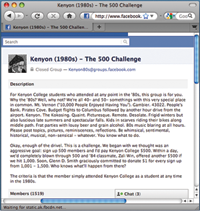Grassroots classmates
 There are plenty of Facebook groups that are created by organizations, to sell or promote something. But a good many Facebook communities sprout spontaneously.
There are plenty of Facebook groups that are created by organizations, to sell or promote something. But a good many Facebook communities sprout spontaneously.
That was the case with "Kenyon (1980s)—The 500 Challenge," a Facebook group started on a whim last December by Lawrence (Larry) Friedberg '84. Deciding to reconnect with Kenyon friends, Friedberg began chatting on Facebook, reaching out to alumni from classes in the 1980s, and soon hit on the idea of issuing a challenge: For every alum who joined the newly created group, up to 500, he would donate $1 to the Kenyon Fund. This all happened on the evening of December 2, 2010.
"Before lunchtime on December 3, we'd blown past the 500 goal," Friedberg recalled. By early 2011, membership had grown to more than 1,500. "This is the beauty of social media," Friedberg said. "The Kenyon 1980s effort was entirely grassroots."
Others joined Friedberg in giving money to the College, and ten other alumni help administer and moderate the group.* The College promotes the group through its own Facebook site. But its main purpose is social, and what sustains it is, in a sense, what has always sustained campus life at Kenyon—conversation, humor, give-and-take both playful and serious.
"The key is making it social, not a fundraiser," says Friedberg. "Those who join were not required to pay anything. Once you ask people to pay, they lose interest. The great content we created together was the real hook."
The site hums along with abundant links to music of the Eighties (and earlier, and later), along with countless Kenyon memories. There was an audio posting of the late English professor Philip Church reading from James Joyce, and an online vigil filled with tributes to classmates who have died. Periodically, members of this generation, twenty to thirty years past their days on Middle Path, muse about their life passages.
"This is not just about reminiscing or wallowing in the past," said Friedberg. Nor is it about posturing in front of peers. Group members "are sharing their perspectives as parents of college-bound or college-age adults. They're being frank about their flaws. There's a lot of candor and honesty, less guardedness."